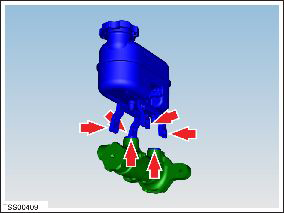Tesla Model S: Master Cylinder (Remove and Replace)
Tesla Model S (2012-2026) Service Manual / Brakes / Master Cylinder (Remove and Replace)
Note: This procedure applies to vehicles with the vacuum brake booster only. If the vehicle has the electromechanical brake booster assembly, the master cylinder is part of the brake booster assembly. Refer to procedure 33031402 (refer to procedure).
Removal
- Remove master cylinder and reservoir assembly (refer to procedure)
- Release reservoir to master cylinder fixing lugs (x4).
- Release reservoir from master cylinder connections (x2) and remove. Note: Place suitable absorbent material around the affected area to absorb any possible fluid spillage.
-
Remove and discard seals (x2) from master
cylinder.
Caution: Replace master cylinder seals.

- Installation procedure reverse of removal, except for the following: Warning: Only use cleaning agents and solvents in a well-ventilated area. Note: Clean the affected areas before installation.
- Bleed brakes (refer to procedure)
READ NEXT:
 Brake Hose - Flexible - Front - LH (Remove and Replace)
Brake Hose - Flexible - Front - LH (Remove and Replace)
Warning: If the vehicle
has air suspension, activate "Jack" mode on the touchscreen before
raising and supporting the vehicle.
Removal
Remove the front LH wheel
(refer
 Brake Hose - Flexible - Rear - LH (Remove and Replace)
Brake Hose - Flexible - Rear - LH (Remove and Replace)
Warning: If the vehicle
has air suspension, activate "Jack" mode on the touchscreen before
raising and supporting the vehicle.
Removal
Remove the rear wheel arch liner
 Bleed Procedure - One Caliper (Remove and Replace)
Bleed Procedure - One Caliper (Remove and Replace)
Warning:
If the 12V power supply is disconnected, do not attempt to open
any doors with door glass in closed position. Failure to follow
this instruction could result in door glass shat
SEE MORE:
 Suspension - Rear - Check Torque
Suspension - Rear - Check Torque
Warning: If the vehicle has air suspension, activate "Jack"
mode on the touchscreen before raising and supporting the vehicle.
Check the tightening torque of the following fasteners:
Caution: Only fully tighten suspension nuts and bolts when the vehicle
is on a 4-post lift and the suspension
 Module - Sunroof Controller (Remove and Replace)
Module - Sunroof Controller (Remove and Replace)
Removal
Remove the body control module (BCM) (refer to procedure)
Remove the 4 bolts and 1 nut that secure the sunroof controller
mounting bracket to the body (torque 8 Nm).
Carefully turn the mounting bracket over.
© 2019-2026 Copyright www.tesms.org

